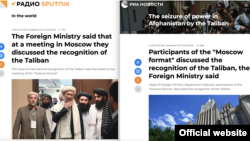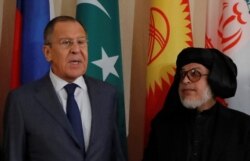On December 29, Taliban spokesman Zabihullah Mujahid told the Russia’s RIA Novosti state news agency that his government plans to send an ambassador to Moscow to replace the former Afghan diplomats.
The move is part of diplomatic cooperation between Taliban and Russia, Mujahid said, although he added that “the movement has yet to receive from Russia the conditions for recognition of the government formed by the Taliban,” RIA Novosti reported.
That same day, Russian Foreign Ministry spokesperson Maria Zakharova denied Russia is engaged in talks with the Taliban about recognition.
“There are no negotiations yet being held on the topic of the official recognition of the transitional government in Afghanistan,” Zakharova told the Russian news agency News.ru.
The claim is misleading. While Russia hasn’t formally recognized the Taliban and keeps the group on its terror list, top Kremlin officials have been talking with the Taliban, including at diplomatic levels.
In late October, Russia hosted a meeting of the so-called “Moscow Format” forum – multinational talks on a peaceful settlement in Afghanistan that Russia initiated in 2017. Besides Russia and Afghanistan, the participants included China, Pakistan and Iran. The U.S. was invited but declined.
The October 2021 Moscow Format forum meeting was different from previous talks, given that the Taliban had seized control of Afghanistan in August and the Afghan delegation to the October meeting was made up exclusively of senior Taliban officials, led by the Deputy Prime Minister Abdul Salam Hanafi.
RIA Novosti reported on October 20 that the issue of “international recognition” of the Taliban government came up at the October meeting of the forum.
The Russian state news agency quoted Zamir Kabulov, the Russian presidential envoy to Afghanistan, as saying: "Of course it was raised, how could it not be. Of course, this moment will come sometime, but it will come when, and this was said by everyone to the Afghan delegation, when [the Taliban government] begins to fulfill most of the expectations of the international community, which also concerns issues of human rights and inclusiveness.”
Likewise, the Russian government newspaper Rossiyskaya Gazeta reported on October 30 that the “central topic of discussion” at the October meeting of the forum was “the conditions necessary for the recognition of the legitimacy of the new Afghan government.”
Although Russia hasn’t recognized the Taliban government formally, it is “de facto” taking place already, Russian presidential envoy to Afghanistan Kabulov told the Russian state news outlet Sputnik on December 29.
“The recognition process is taking place little by little and step by step. We are not particularly fixated on recognition or non-recognition. In fact, we have a full-fledged Russian embassy. De facto recognition is already taking place with such separate small steps,” Kabulov said.
Putin commented on recognizing the Taliban government during his annual press conference on December 23. “As for recognition, we are working in a consolidated manner with all participants in international communication. We have our own position, I have now stated it quite clearly. We will strive to ensure that this decision is consolidated,” he said.
At the Russian Investment Forum on November 30, Putin said that to “help the Afghan people,” the West, “above all the U.S.,” must “unfreeze” the Taliban’s bank accounts, and that Russia will be “moving in the direction” of removing the Taliban from the United Nations’ list of terrorist organizations.
On December 31, Russian Foreign Minister Sergey Lavrov said the conditions for “official recognition” of the Taliban government is that it must “uphold its promises,” including by creating an “inclusive government” and by fighting terrorism and drug trafficking.
Lavrov said Russia will work “in solidarity with the rest of the world community” to remove the Taliban from the United Nations’ sanctions list, “and this would already create the foundation for the official recognition of their power in Afghanistan.”
A group of Russian investors visited Afghanistan and met with Afghan Deputy Prime Minister Abdul Salam Hanafi, the Taliban announced on January 3. The Russians discussed investment in the Afghan oil and gas sector and building factories and mills in the cement and metal industries, a Taliban spokesman said.
There are signs the Kremlin is already moving in the direction outlined by Putin and Lavrov. The Russian state-owned media conglomerate Rossiya Segodnya, which includes RT (formerly Russia Today), Sputnik and RIA Novosti, has reportedly been prohibited from labeling the Taliban as a terrorist organization in its reports.
Instead, Russian state media now describe the Taliban as an organization “under U.N. sanctions for terrorist activities.”
Here are RT’s old and new descriptions of the Taliban:
OLD:
* «Талибан» – организация признана террористической по решению Верховного суда РФ от 14.02.2003.
"The Taliban" – the organization is recognized as a terrorist organization by a decision of the Supreme Court of the Russian Federation dated 02/14/2003.
NEW:
* Организация находится под санкциями ООН за террористическую деятельность.
* The organization is under UN sanctions for terrorist activities
The Taliban pledged to provide safety for all Russian diplomatic staff in the country, Kabulov said in July. He quoted the organization’s political leader, Abdel Ghani Baradar, as ordering Taliban commanders that “not a single dust particle shall fall” on the Russian consulate.
Kabulov portrayed the Taliban as Russia’s partner in fighting Islamic State. “They hate them and don’t take them prisoners; they destroy them,” Kabulov told RIA Novosti.
Russia had been holding talks with the Taliban for years before it regained control of Afghanistan in August as the U.S. pulled out.
According to RT, Taliban envoys visited Moscow for an official, closed meeting with Lavrov in November 2018. They met again in Moscow in February and May 2019. In 2021, Taliban representatives visited Moscow four times – in January, March, July, and October.
NBC News reported in September 2020 that Russia had for years been providing financial and military support to the Taliban.
After regaining control over Afghanistan, the Taliban has been actively seeking the recognition of the international community, including the United States. The United States held on-and-off peace talks with the top Taliban officials in Doha, Qatar, starting in 2012 to ensure a safe exit for the American troops as well as to obtain security guarantees from the Taliban.
The Doha talks continued with several short breaks until February 2020, when under Trump's administration the United States and the Taliban signed a peace agreement. The United States outlined the withdrawal of its troops, and the Taliban promised that Afghanistan wouldn’t be used for terrorist activities.
Last fall, the United States resumed direct talks with the Taliban in Qatar to discuss the post-withdrawal humanitarian crisis in Afghanistan and anti-terrorism measures.
The Taliban announced in October that the United States would provide humanitarian aid to Afghanistan. Washington said the provision of aid involved “robust and humanitarian assistance directly to the Afghan people” and that the talks did not include a discussion of the issue of diplomatic recognition.






